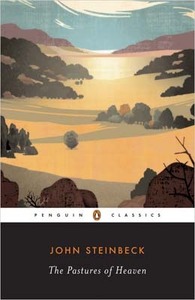Take a photo of a barcode or cover
I love Steinbeck, so I'm always biased. The Pastures of Heaven, however, strikes me as one of those books that a person has to seek out rather than stumble over. Until I found my old second-hand copy, I wasn't aware of its existence.
I think that's because it falls into a strange place in his catalogue, somewhere between a collection of short stories and Cannery Row. The book, if anything, is really a collection of character studies, which sometimes inter-relate. The same could be said about Cannery Row, but The Pastures of Heaven doesn't quite have the same kind of connections as Cannery Row; the walls are too high between them to call it a novel.
That being said, as it's by Steinbeck, rest assured that all the characters are worth reading about. He presents, as always, a little slice of life which breathes and moves upon the page. Soon it's not the dusky scent of an old book that's wafting up, but a heady whiff of good farm dirt, or the smell of 'worms' after a rain.
It's a book that's worth reading a little bit at at time, preferably on a winter Sunday afternoon before a fire, and reading slowly to digest properly.
Once again, Steinbeck does not fail to make an extraordinary description of its story scenarios. However, being an early work of Steinbeck, the narrative resembles more of The Red Pony than the latter works such as The Pearl or East of Eden. It's not a bad book, but it lacks something. While you are closing the book, after you're done with it, you don't find yourself either smiling or in awe, something that for sure is typical for someone who often reads Steinbeck. We all remember how we felt after finishing reading Of Mice and Men.
Interconnected stories about farm life near Monterey. Interesting lives with the classic stories of people claiming a piece of land for themselves and others wondering what goes on behind closed doors.
I chose this as one of the books I took along to read on vacation in San Francisco because it is about Northern California and because I had recently read "Travels with Charlie" and really enjoyed it. And because I could borrow it from my friend S. It's a lovely book, consisting of several somewhat-related vignettes about people living in a rural valley near Monterey, CA. They're very well-rendered characters, with less sentimentalism than the characters in "Cannery Row." The stories are mostly somewhat tragic in nature, but overall I wouldn't call it a sad book. A common theme in the stories is the role of grand plans in human lives. Usually in this book, the plans are basically ruined, but the different stories give a variety of perspectives on that--sometimes the act of planning itself seems to be the most valued part, and other times Steinbeck portrays it as foolish or arrogant.
Reading these stories, one can't help but feeling what being a man must be like even in one of the most idyllic places imaginable. All the dreams, all the wishing good vanishes once evil gets in. One of the first works of the great Steinbeck, really worth reading.
adventurous
emotional
funny
hopeful
lighthearted
reflective
relaxing
sad
medium-paced
challenging
emotional
funny
sad
medium-paced
Plot or Character Driven:
Character
Strong character development:
Yes
Loveable characters:
Yes
Diverse cast of characters:
Yes
Flaws of characters a main focus:
Yes
Steinbeck can do no wrong in my opinion. (Even The Pearl and The Red Pony, which I had to mark down for killing so much, are still literary masterpieces.) He has unequivocally become my favorite author. This little book of short stories is no different. The passion and love that Steinbeck has for his home town of Salinas, California shines thru on the pages of many of these books.
The layout is similar to that of Cannery Row, short chapters on various people in the small town and the escapades they get up to. But all of these stories center around one family, the Munroes, who move into the old cursed Battle farm. They manage to remake the farm into something prosperous and are good people but somehow they manage to bring bad luck to their neighbors and friends without even knowing it. Jobs become tedious, love affairs go awry, homes catch fire, and people even die.
“Maybe your curse and the farm's curse mated and gone into a gopher hole like a pair of snakes. Maybe they'll be a lot of baby curses crawling around in Pastures of Heaven.”
Unlike Cannery Row, there is not an optimism to these stories. These people get worn down and broken and it's sad to read about. *spoilers ahead* My favorite story (and the saddest in my opinion) was about Pat Humbert, a 30-something year old man who lives with his elderly parents until they die. He inherits their family home but cannot bring himself to make any changes or even enter the sitting room that his parents inhabited each day. He closes it up and ignores the ghosts that haunt him at night, by going out to town and joining all the groups he can find. Even though he joins these groups and participates, he is still on the sidelines, rarely interacting with others unless they do so first. One day, he overhears the young and lovely Mae Munroe (of the cursed Munroes) mention how beautiful the outside of his home is and this sparks an energy in him to remake his home and himself, so that he may eventually court the girl. He starts with the sitting room and tears it apart, freeing the ghosts inside. He becomes obsessed with redecorating, even looking at magazines at the library. He finally finishes and declares himself ready to greet Mae. But when he goes over to her home, he discovers the family celebrating her engagement to another young man in town. And he is heartbroken. He returns home and is repulsed by all his effort, claims the home is dark and unutterably dreary, and refuses to step foot into the house again, sleeping in the barn instead. That is where his story ends.
After the bare requisites to living and reproducing, man wants most to leave some record of himself, a proof, perhaps, that he has really existed. He leaves his proof on wood, on stone or on the lives of other people.
This deep desire exists in everyone, from the boy who writes dirty words in a public toilet to the Buddha who etches his image in the race mind.
Life is so unreal. I think that we seriously doubt that we exist and go about trying to prove that we do.
Reviewed at Give a Hoot Read a Book!
The layout is similar to that of Cannery Row, short chapters on various people in the small town and the escapades they get up to. But all of these stories center around one family, the Munroes, who move into the old cursed Battle farm. They manage to remake the farm into something prosperous and are good people but somehow they manage to bring bad luck to their neighbors and friends without even knowing it. Jobs become tedious, love affairs go awry, homes catch fire, and people even die.
“Maybe your curse and the farm's curse mated and gone into a gopher hole like a pair of snakes. Maybe they'll be a lot of baby curses crawling around in Pastures of Heaven.”
Unlike Cannery Row, there is not an optimism to these stories. These people get worn down and broken and it's sad to read about. *spoilers ahead* My favorite story (and the saddest in my opinion) was about Pat Humbert, a 30-something year old man who lives with his elderly parents until they die. He inherits their family home but cannot bring himself to make any changes or even enter the sitting room that his parents inhabited each day. He closes it up and ignores the ghosts that haunt him at night, by going out to town and joining all the groups he can find. Even though he joins these groups and participates, he is still on the sidelines, rarely interacting with others unless they do so first. One day, he overhears the young and lovely Mae Munroe (of the cursed Munroes) mention how beautiful the outside of his home is and this sparks an energy in him to remake his home and himself, so that he may eventually court the girl. He starts with the sitting room and tears it apart, freeing the ghosts inside. He becomes obsessed with redecorating, even looking at magazines at the library. He finally finishes and declares himself ready to greet Mae. But when he goes over to her home, he discovers the family celebrating her engagement to another young man in town. And he is heartbroken. He returns home and is repulsed by all his effort, claims the home is dark and unutterably dreary, and refuses to step foot into the house again, sleeping in the barn instead. That is where his story ends.
After the bare requisites to living and reproducing, man wants most to leave some record of himself, a proof, perhaps, that he has really existed. He leaves his proof on wood, on stone or on the lives of other people.
This deep desire exists in everyone, from the boy who writes dirty words in a public toilet to the Buddha who etches his image in the race mind.
Life is so unreal. I think that we seriously doubt that we exist and go about trying to prove that we do.
Reviewed at Give a Hoot Read a Book!
I'm continually amazed and how surprised I am that he has such a way with words to describe things simply yet elegantly at the same time.
emotional
reflective
medium-paced
Plot or Character Driven:
Character
Strong character development:
Yes
Loveable characters:
Complicated
Diverse cast of characters:
Yes
Flaws of characters a main focus:
Yes



